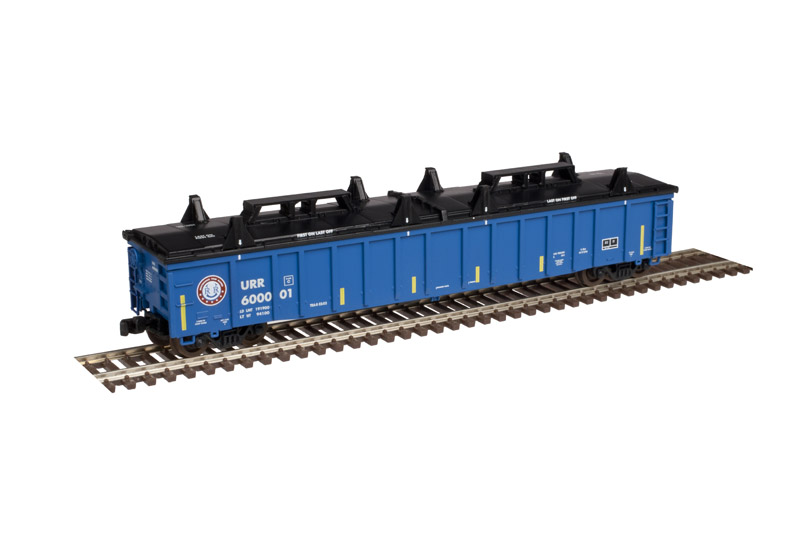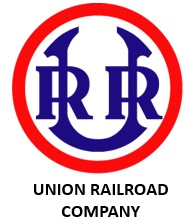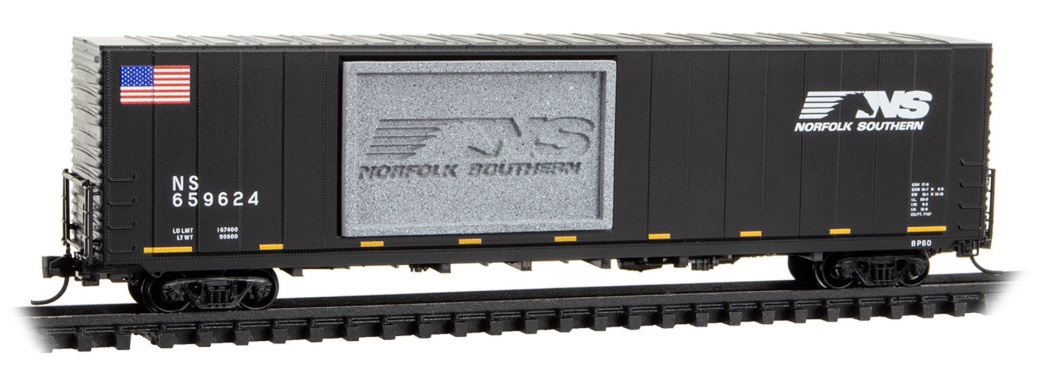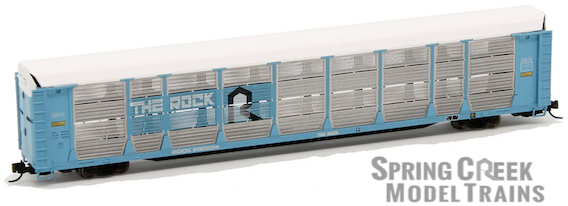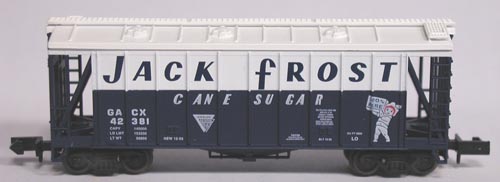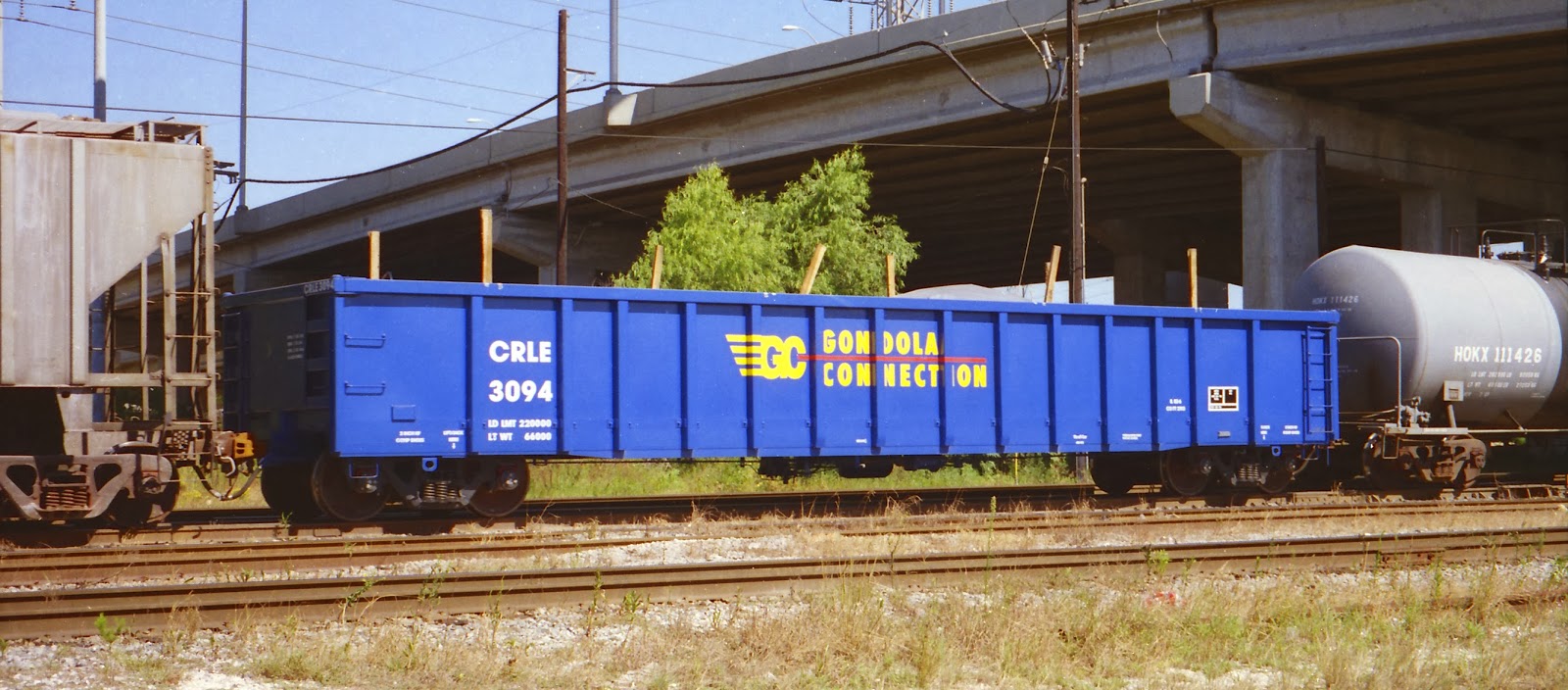Specific Item Information: W/Lid
Model Information: This model was announced in December of 2008 and first released in May of 2009. It is comparable in quality to the Micro-Trains fix-end 50 foot gondolas in quality of construction and model features. The features include: Prototypical scale height reflecting the new higher capacities standard; Fourteen side posts; Separate ladders; Detailed stirrups; Accurate painting and lettering. Of particular interest are the detailed ladders and stirrups which are more typical of a 3rd generation model. The truck-mounted couplers and plastic wheels, however, squarely put this model in the 2nd generation zone.
Prototype History: Introduced by Thrall Car Manufacturing Co., in 1995, with its new interior height of 5' 6" (i.e., a 6" increase in height over the previous standard), the firm's contemporary design for a 52' 6" length 2743 cubic foot capacity gondola car took advantage of a (then) newly allowed increase in Gross Rail Loading (GRL) of 286,000 lbs, which was up from the previous limit of 263,000 lbs.
Acquired by Trinity Industries (now TrinityRail) in 2001, from 1995 to 1999, Thrall produced over 6,700 of the 2743 gondolas.
The manufacture of the 2743 design was resumed by Trinity in 2005.
Acquired by Trinity Industries (now TrinityRail) in 2001, from 1995 to 1999, Thrall produced over 6,700 of the 2743 gondolas.
The manufacture of the 2743 design was resumed by Trinity in 2005.
Road Name History: The URR opened in 1896 to serve the steel producing Monongahela River Valley region south of Pittsburgh. In 1937, it merged two other local lines. The Union is just 31 miles long but very busy. In 1951, they hauled 74 million net tons making URR the busiest railroad per mile of track in the world. The line is owned by U.S. Steel (and its successor) and at its peak served eight mills plus a number of other customers. Until recently, the tangle of Union lines crossed the Monongahela River four times. Today, Union serves USS Edgar Thomson Works which includes blast furnaces, basic oxygen process producing molten steel and a continuous caster; USS Irvin Works which includes rolling mills and finishing lines and USS Clairton Works which converts coal into coke.
The Union is the smallest railroad to have a steam locomotive wheel arrangement named for them. The uber-switcher 0-10-2 is called the Union type.
The Union diesel fleet has always been dominated by switchers, originally from EMD, Alco, and Baldwin but in later years from EMD exclusively. Road power over the years has included RS-2’s, DRS-6-6-1500’s, AS616’s, and in later years SD9’s and SD38-2’s. The number of diesels on the active roster seems to have peaked around 126 units – astounding for a 31 mile line.
Beginning in 1959 the dozen Baldwin DRS-6-6-1500’s were rebuilt with EMD prime movers and long hoods. The short hoods were also lowered. The crews called these rebuilts “buffalos.” These units retained their long hood as the front despite the nose chop and could be found leading in either direction.
Today there are 33 diesels on the active roster, all EMD SW1500’s and MP15DC’s. You may notice that all-switcher consists always have the cabs facing outward (since virtually all end cab switchers have the hood end as the front, the URR consists are nose to nose.) This method is gospel on URR and has gained favor on other lines due to improved sight lines when shoving with no loss when running with the cab end leading.
The Union connects with CSX, Norfolk Southern, CN (formerly Bessemer & Lake Erie), and Wheeling & Lake Erie at seven points along the route. Today's collection of photos takes us from the delivery of the 0-10-2's in 1936 to 1999. We will have the rest of URR collection with tomorrow's RRotD. It's worth noting that URR was known for having an aggressive security force during the transition era which explains the dearth of photos from that time.
The Union is the smallest railroad to have a steam locomotive wheel arrangement named for them. The uber-switcher 0-10-2 is called the Union type.
The Union diesel fleet has always been dominated by switchers, originally from EMD, Alco, and Baldwin but in later years from EMD exclusively. Road power over the years has included RS-2’s, DRS-6-6-1500’s, AS616’s, and in later years SD9’s and SD38-2’s. The number of diesels on the active roster seems to have peaked around 126 units – astounding for a 31 mile line.
Beginning in 1959 the dozen Baldwin DRS-6-6-1500’s were rebuilt with EMD prime movers and long hoods. The short hoods were also lowered. The crews called these rebuilts “buffalos.” These units retained their long hood as the front despite the nose chop and could be found leading in either direction.
Today there are 33 diesels on the active roster, all EMD SW1500’s and MP15DC’s. You may notice that all-switcher consists always have the cabs facing outward (since virtually all end cab switchers have the hood end as the front, the URR consists are nose to nose.) This method is gospel on URR and has gained favor on other lines due to improved sight lines when shoving with no loss when running with the cab end leading.
The Union connects with CSX, Norfolk Southern, CN (formerly Bessemer & Lake Erie), and Wheeling & Lake Erie at seven points along the route. Today's collection of photos takes us from the delivery of the 0-10-2's in 1936 to 1999. We will have the rest of URR collection with tomorrow's RRotD. It's worth noting that URR was known for having an aggressive security force during the transition era which explains the dearth of photos from that time.
Brand/Importer Information: In 1924 Stephan Schaffan, Sr. founded the Atlas Tool Company in Newark, New Jersey. In 1933 his son, Stephan Schaffan, Jr., came to work for his father at the age of sixteen. Steve Jr. built model airplanes as a hobby and frequented a local hobby shop. Being an enterprising young man, he would often ask the owner if there was anything he could do to earn some extra spending money. Tired of listening to his requests, the hobby-store owner threw some model railroad track parts his way and said, "Here, see if you can improve on this".
In those days, railroad modelers had to assemble and build everything from scratch. Steve Jr. created a "switch kit" which sold so well, that the entire family worked on them in the basement at night, while doing business as usual in the machine shop during the day.
Subsequently, Steve Jr. engineered the stapling of rail to fiber track, along with inventing the first practical rail joiner and pre-assembled turnouts and flexible track. All of these products, and more, helped to popularize model railroading and assisted in the creation of a mass-market hobby. The budding entrepreneur quickly outgrew the limitations of a basement and small garage operation. Realizing they could actually make a living selling track and related products, Steve and his father had the first factory built in Hillside, New Jersey at 413 Florence Avenue in 1947. On September 30, 1949, the Atlas Tool Company was officially incorporated as a New Jersey company.
In 1985, Steve was honored posthumously for his inventions by the Model Railroad Industry Association and was inducted into the Model Railroad Industry Hall of Fame in Baltimore, Maryland. In addition, Steve was nominated and entered into the National Model Railroad Association Pioneers of Model Railroading in 1995.
In the early 1990s, the Atlas Tool Company changed its name to Atlas Model Railroad Company, Inc.
In those days, railroad modelers had to assemble and build everything from scratch. Steve Jr. created a "switch kit" which sold so well, that the entire family worked on them in the basement at night, while doing business as usual in the machine shop during the day.
Subsequently, Steve Jr. engineered the stapling of rail to fiber track, along with inventing the first practical rail joiner and pre-assembled turnouts and flexible track. All of these products, and more, helped to popularize model railroading and assisted in the creation of a mass-market hobby. The budding entrepreneur quickly outgrew the limitations of a basement and small garage operation. Realizing they could actually make a living selling track and related products, Steve and his father had the first factory built in Hillside, New Jersey at 413 Florence Avenue in 1947. On September 30, 1949, the Atlas Tool Company was officially incorporated as a New Jersey company.
In 1985, Steve was honored posthumously for his inventions by the Model Railroad Industry Association and was inducted into the Model Railroad Industry Hall of Fame in Baltimore, Maryland. In addition, Steve was nominated and entered into the National Model Railroad Association Pioneers of Model Railroading in 1995.
In the early 1990s, the Atlas Tool Company changed its name to Atlas Model Railroad Company, Inc.
Item created by: Steve German on 2016-04-12 14:12:31. Last edited by CNW400 on 2020-08-24 13:45:17
If you see errors or missing data in this entry, please feel free to log in and edit it. Anyone with a Gmail account can log in instantly.
If you see errors or missing data in this entry, please feel free to log in and edit it. Anyone with a Gmail account can log in instantly.


